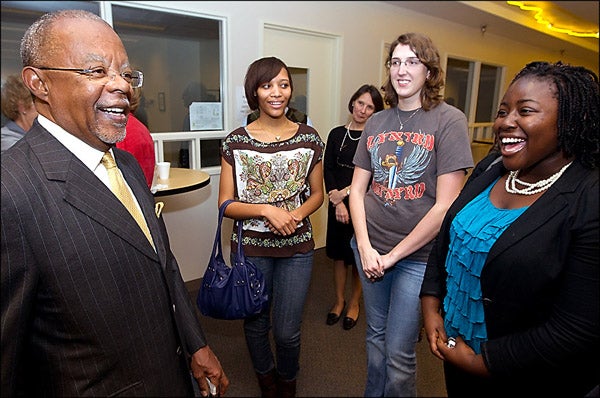Gates shares passion for personal history
Personal history is everyone’s favorite subject, Harvard scholar Henry Louis Gates Jr. told the near-capacity crowd gathered for the Voyages of Discovery Lecture Series at East Carolina University Thursday night.
“We all long to know who we are and where we came from,” he said. “Our favorite subject is ourselves.”
Gates is director of the W.E.B. Dubois Institute for African and African-American Research at Harvard University. He spoke on “African-American Lives: Genetics, Genealogy, and Black History,” in recognition of the 50th anniversary of integration at ECU.
He discussed his personal family history, citing his passion for genealogy and how the new science of genetics and DNA can pick up where the historical paper trail leaves off.
His desire to make documentaries charting genealogies started the day he “met” Jane Gates, the oldest recorded Gates slave who lived from 1819-1888. The house she purchased for $1,200 in 1870, five years after she was freed, remained in the family.
When Gates’ grandfather died, his father took him upstairs to the grandparents’ bedroom to share an armoire full of what looked at first like stolen bank ledgers. In reality they were scrapbooks filled with hundreds of news clippings.
One in particular caught his eye: “Died this Day Jane Gates an Estimable Colored Woman.” He looked up the definition of “estimable” in the Webster’s Dictionary; it said “deserving of esteem, admirable.”
Gates shared video footage from his PBS series “African American Lives,” showing clips of genealogy chartings with well-known African Americans. Actor Morgan Freeman was included in the piece, as was Linda Johnson Rice, president and CEO of Johnson Publishing Company. Rice was moved to find out her great-grandfather founded the Alabama Baptist Normal and Theological School, which later became Selma University. Actor Chris Rock learned that his ancestor was a general in the U.S. Civil War.
During her genealogy search, poet Mayo Angelo remarked, “Our heritage is so complex. We have to consider ourselves global.”
Gates said he wanted to “use our fascination with lineage to revolutionize the way we teach science and social studies.”
“Imagine the thrill of swabbing your cheek for DNA to find your ancestors during science class or researching your family tree from federal census records kept after 1870, when for the first time a first and last name for slaves were recorded,” he said.
“What child wouldn’t be turned on by this,” he said.
